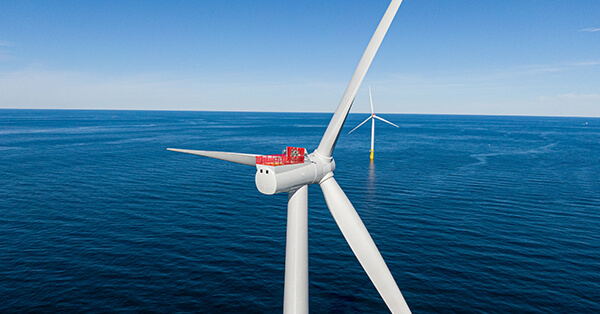A proposed settlement between Dominion Energy, the Virginia attorney general and other groups would set up new consumer protections and performance reporting for the Coastal Virginia Offshore Wind project.
The settlement is a compromise with Dominion, which had objected to hard power performance guarantees demanded by the State Corporation Commission on Aug. 5. The state regulators wanted to hold the $9.8 billion CVOW to producing at least a 42 percent annualized average of its maximum 2.6-gigawatt capacity, and would have forbidden passing additional costs on to ratepayers if the 176-turbine array fails to perform to that level.
In a Sept. 29 filing with the commission, Dominion warned the performance guarantee would “prevent the project from moving forward and the company will be forced to terminate all development and construction activities” – despite already investing $839 million, including two pilot project turbines 27 miles off Virginia Beach, and ongoing construction of the wind turbine installation vessel (WTIV) Charybdis at Brownsville, Texas.
Dominion and Attorney General Jason Miyares announced the settlement plan Friday, after filing a joint stipulation and recommendation with the State Corporation Commission, which must approve it.
“This hard-fought agreement includes unprecedented consumer protections for Virginians,” said Miyares. “Traditionally, Virginia consumers have paid for all of the costs of utility projects. Today’s agreement changes that in the event of cost overruns. Dominion Energy has agreed to cost sharing and a cost cap on construction expenses, after which it will be responsible for all cost overruns. The agreement also includes a performance standard designed to ensure that the project produces the energy promised.”
Instead of the hard performance minimum guarantee the commission originally called for Aug. 5, Dominion said the settlement poses an alternative, requiring detailed reporting on turbine performance.
“The company will not be required to guarantee future energy production levels or factors beyond its control as was outlined in the August (state commission) Order. Instead, the company will provide a detailed explanation of the factors contributing to any shortfall in energy output from projected amounts in a future SCC proceeding,” according to a summary released by Dominion.
If the SCC does find excessive costs come from “unreasonable or imprudent actions” on Dominion’s part, the commission could hold the company responsible. The settlement spells out how cost overruns would be allocated.
“Should the project run materially over budget, it will come out of Dominion’s pocket, not consumers’,” according to Miyares.
“The agreement provides for initial cost sharing between customers and Dominion up to $11.3 billion. If the construction costs fall between $10.3 billion and $11.3 billion, Dominion and consumers will share those additional costs evenly. If the construction costs of the project exceed $11.3 billion, Dominion is required to pay those additional costs in full,” according to a statement from the attorney general’s office.
“In the unlikely event that the project’s construction costs exceed $13.7 billion, the project will be put back before the SCC for a further determination of viability and/or cost allocation,” according to the attorney general’s office. “This feature of the agreement protects all stakeholders from catastrophic cost overruns.”
Co-signers on the proposed settlement include Walmart – Virginia’s largest private employer, and a significant future user of renewable energy from Dominion – and the nonprofit groups Sierra Club and Appalachian Voices, which had sought consumer protection guarantees.
“The settlement agreement provides a balanced and reasonable approach that supports continued investment in CVOW to meet the Commonwealth's public policy and economic development priorities and the needs of Dominion Energy Virginia's 2.7 million customers representing more than 5 million people and businesses,” according to a statement from Dominion Energy.
“The settlement agreement aligns with the customer-focused, state regulated utility framework in Virginia. That framework has resulted in nation-leading decarbonization goals, customer rates lower than national and relevant regional averages, and high levels of reliability for customers, made possible by a state regulatory model that embraces long-term planning, a diversity of generation sources, and resiliency safeguards,” according to the company.
"I appreciate the thoughtful effort of all parties in reaching a constructive agreement to allow the project to continue moving forward," said Bob Blue, Dominion Energy chairman, president and chief executive officer.
Inflation and escalating material costs have raised risks for U.S. offshore wind power developers, and Blue said Dominion has taken steps for staying on-time and on-budget for CVOW.
“Development of the project has continued uninterrupted to maintain the project's schedule. We expect over 90 percent of the project costs, excluding contingency, to be fixed by the end of the first quarter in 2023 as compared to about 75 percent today, further de-risking the project and its budget,” said Blue.
"We have a lot of work ahead as we continue to build on our long record of completing projects on-time and on-budget while safely delivering affordable, reliable, and clean energy to our customers. Offshore wind is expected to alleviate pressure on customer fuel rates for 30 years once the project is in-service. Our customers expect reliable, affordable energy – and offshore wind is key for accomplishing that mission."



.JPG.small.400x400.jpg)

